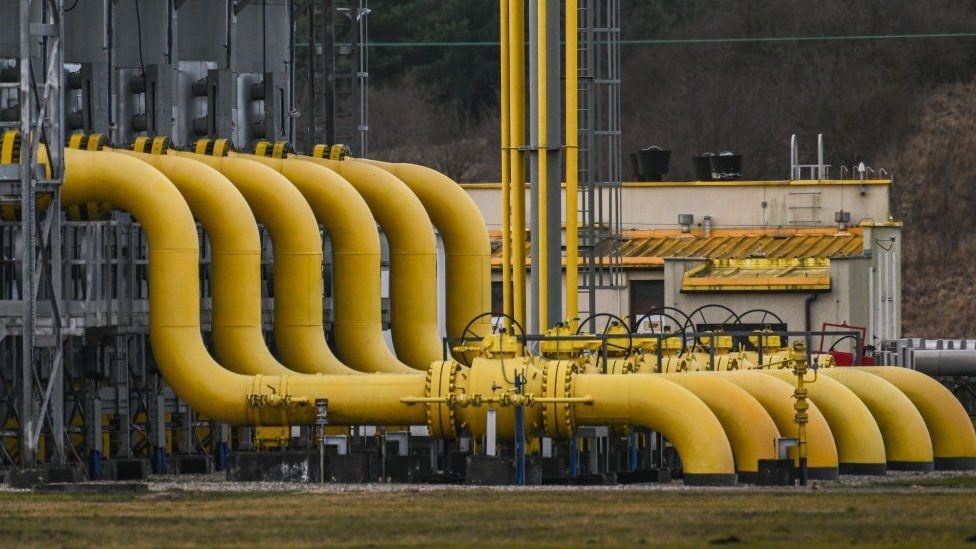Gazprom: Gas supply halted to Bulgaria, Poland until payment in rubles
Gazprom announced it would halt Russian imports to Bulgaria and Poland until their dues are paid in rubles.
-

Russia gas to Poland resumes, but no word on Bulgaria.
Russia's Gazprom announces the suspension of gas supplies to Bulgaria and Poland due to the non-payment of dues in rubles.
Russian energy giant Gazprom announced on Wednesday that it had completely suspended gas supplies to Bulgaria's largest natural gas distribution company Bulgargaz and Polish oil and gas company PGNiG, as the companies failed to pay for gas in rubles.
As of the end of the business day on April 26, Gazprom Export had not received payments for gas supplies in April from Bulgargaz and PGNiG in rubles.
"Gazprom has completely suspended gas supplies to Bulgargaz (Bulgaria) and PGNiG (Poland) due to non-payment in rubles … Gazprom Export has notified Bulgargaz and PGNiG of the suspension of gas supplies from April 27 until the payment is made in accordance with the procedure established by the decree (of Russian President Vladimir Putin]," the company said in a statement.
The energy giant added that it will reduce transit to third countries if Bulgaria and Poland begin to withdraw gas from the transit flow without authorization.
Earlier today, Russian gas shipments to Poland under the Yamal contract were interrupted today, Wednesday, according to data from European Union gas transmission operators, amid heightening fears that Russia may cut supply to the allies of Ukraine in what the latter refers to as "gas blackmail".
Russia announced it would suspend gas imports to Poland and Bulgaria on Wednesday, following blasts in a breakaway region of neighboring Moldova that prompted Kiev to accuse Moscow of attempting to extend the Ukraine war into Europe.
In response to the draconian set of sanctions imposed on Russia following its operation, Russia's energy giant Gazprom informed Poland and highly dependent Bulgaria that it would cut off supply.
Explosions targeting the state security ministry, a radio tower, and a military unit in neighboring Moldova's Transnistria – held by Moscow's forces for decades – occurred last week in response to a Kremlin commander's accusations that Russian speakers in the nation were repressed.
Earlier, Russia had warned against the NATO expansion to Ukraine, Georgia, and Moldova, calling it a life-or-death situation.
This raised concerns that Moldova could be next in Russia's attempt to secure its borders against the NATO expansion in the region, contrary to all agreed-upon laws and covenants.
"Russia wants to destabilize the Transnistrian region," Mykhaylo Podolyak, a Ukraine presidential aide, claimed.
"If Ukraine falls, tomorrow Russian troops will be at Chisinau's gates," he said, referring to Moldova's capital.
The US expressed similar worries but stopped short of endorsing Kiev's claim that Russia was to blame.
"We fully support Moldova's territorial integrity and sovereignty," State Department Spokesperson Ned Price told reporters.
Will the war keep extending?
With armaments pouring into Ukraine, Germany declared Tuesday that it will supply anti-aircraft tanks, reversing its previously criticized cautious posture.
Britain will also push Kiev's allies to "increase" military production, including tanks and planes, to assist Ukraine, with Foreign Secretary Liz Truss calling for a "new approach" to fight Russian President Vladimir Putin.
"We must be prepared for the long haul and double down on our support for Ukraine," she is set to say, according to pre-released remarks.
"Heavy weapons, tanks, aeroplanes -- digging deep into our inventories, ramping up production. We need to do all of this," she will add.
Truss will also urge Europe to cease Russian energy imports "once and for all," depriving Moscow of a crucial source of leverage over its reliant western neighbors.
Bulgaria, which is nearly entirely reliant on Russia for its annual gas consumption, said it had received information from energy behemoth Gazprom that supplies would be suspended beginning Wednesday.
Poland's PGNiG gas company, too, announced that Moscow will turn off the taps, even though its Prime Minister stated that the country's gas storage facilities were 76% full and that it was prepared to get necessary supplies from other sources.

 4 Min Read
4 Min Read









